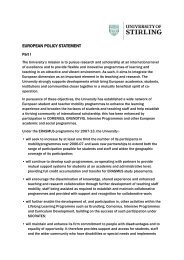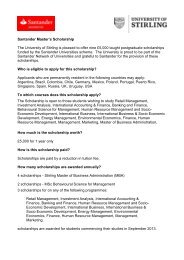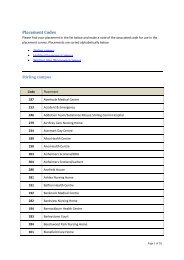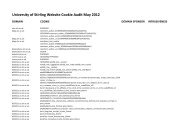Health First: An evidence-based alcohol strategy for the UK
Health First: An evidence-based alcohol strategy for the UK
Health First: An evidence-based alcohol strategy for the UK
You also want an ePaper? Increase the reach of your titles
YUMPU automatically turns print PDFs into web optimized ePapers that Google loves.
<strong>Health</strong> <strong>First</strong>: an <strong>evidence</strong>-<strong>based</strong> <strong>alcohol</strong> <strong>strategy</strong> <strong>for</strong> <strong>the</strong> <strong>UK</strong><br />
chapter 10<br />
Building on progress<br />
Summary<br />
Real progress is being made throughout <strong>the</strong> <strong>UK</strong> in tackling <strong>alcohol</strong>-related harm. However much remains<br />
to be done. There is a need <strong>for</strong> a comprehensive approach which combines progressive action on price<br />
with stronger regulation of <strong>alcohol</strong> products, elimination of <strong>alcohol</strong> promotion, re<strong>for</strong>m of licensing and<br />
greater investment in early intervention and treatment.<br />
Ambitious targets are needed to drive and monitor progress. For <strong>the</strong> <strong>UK</strong> as a whole, <strong>the</strong> following targets<br />
are proposed:<br />
• To reduce <strong>alcohol</strong> sales in <strong>the</strong> <strong>UK</strong> from 10.2 to 8 litres of pure <strong>alcohol</strong> per adult per year by 2020<br />
• To reduce <strong>the</strong> rate of liver deaths from 11.4 to 4 per 100,000 population by 2020<br />
Fur<strong>the</strong>r targets are needed including specific targets <strong>for</strong> <strong>the</strong> nations and regions of <strong>the</strong> <strong>UK</strong>.<br />
Recommendation<br />
• The <strong>UK</strong> government and <strong>the</strong> devolved administrations should develop appropriate <strong>alcohol</strong> policy<br />
targets <strong>for</strong> each of <strong>the</strong> nations and regions of <strong>the</strong> <strong>UK</strong>.<br />
National <strong>strategy</strong><br />
Across <strong>the</strong> <strong>UK</strong>, a great deal of progress has already<br />
been made in taking <strong>for</strong>ward <strong>the</strong> recommendations<br />
of this report. Table 10.1 describes this progress in<br />
detail <strong>for</strong> each of <strong>the</strong> nations and regions of <strong>the</strong> <strong>UK</strong>.<br />
Scotland is leading <strong>the</strong> way but <strong>the</strong>re has been real<br />
progress throughout <strong>the</strong> country.<br />
This progress must be built on. This report has set out<br />
<strong>the</strong> scale of <strong>the</strong> harm from <strong>alcohol</strong>, <strong>the</strong> strength of <strong>the</strong><br />
<strong>evidence</strong> <strong>for</strong> effective intervention and <strong>the</strong> increasing<br />
public support <strong>for</strong> tougher measures. The way <strong>for</strong>ward<br />
should be to bring <strong>the</strong>se toge<strong>the</strong>r in a comprehensive<br />
<strong>strategy</strong> to tackle <strong>the</strong> harm from <strong>alcohol</strong> across <strong>the</strong><br />
<strong>UK</strong>. We need to be ambitious not only in tackling <strong>the</strong><br />
price of <strong>alcohol</strong> but also in regulating <strong>alcohol</strong> products,<br />
eliminating <strong>alcohol</strong> promotion and controlling <strong>the</strong><br />
overall availability of <strong>alcohol</strong> in our communities.<br />
Greater investment in treatment and early intervention<br />
is also vital. Significant long-term reductions in <strong>the</strong><br />
harm from <strong>alcohol</strong> will only be achieved through a<br />
genuinely comprehensive <strong>strategy</strong>.<br />
Targets<br />
In order to assess progress in reducing <strong>the</strong> harm from<br />
<strong>alcohol</strong> in <strong>the</strong> <strong>UK</strong>, we propose two broad targets. They<br />
are:<br />
• To reduce <strong>alcohol</strong> sales in <strong>the</strong> <strong>UK</strong> from 10.2 to 8<br />
litres of pure <strong>alcohol</strong> per adult per year by 2020<br />
• To reduce <strong>the</strong> rate of liver deaths from 11.4 to 4<br />
per 100,000 population by 2020<br />
These targets are ambitious; <strong>the</strong>y are also measurable.<br />
Population-level indicators of <strong>alcohol</strong>-related harm <strong>for</strong><br />
<strong>the</strong> <strong>UK</strong> are hard to come by because of <strong>the</strong> differences<br />
in how data are sourced between <strong>the</strong> regions and<br />
nations of <strong>the</strong> <strong>UK</strong>. Fur<strong>the</strong>rmore, subjective indicators,<br />
such as individuals’ own assessments of how much<br />
<strong>the</strong>y drink, are unreliable as national indicators.<br />
The first target focuses on <strong>the</strong> overall level of <strong>alcohol</strong><br />
consumption in <strong>the</strong> <strong>UK</strong> population, using sales as a<br />
proxy indicator. In order to reduce <strong>the</strong> harm from<br />
43
















